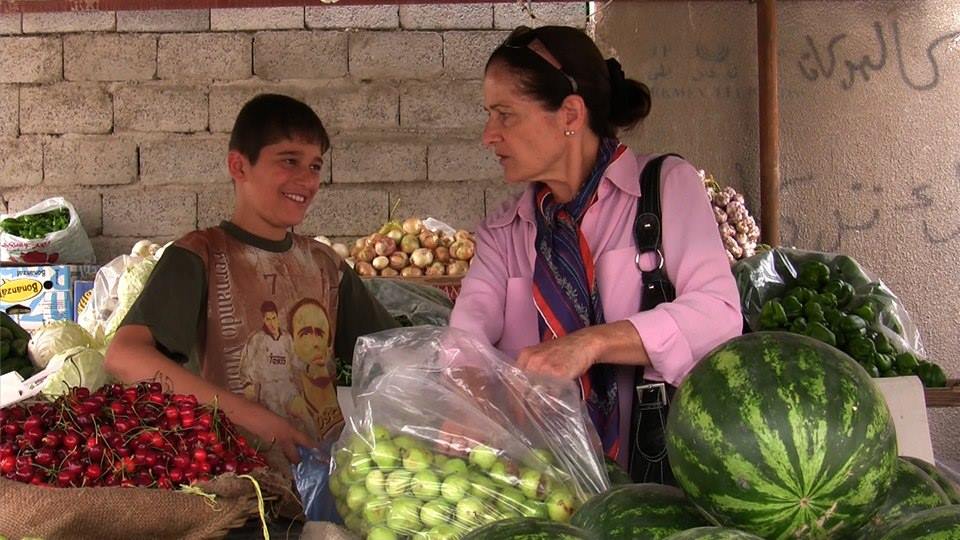Reshaping our World Film Series: Trapped in the Scene (Shorts)
- 07/26/2017
- 7:30 PM - 9:30 PM CDT
Event details
Tickets: $10 ($8 Walker members, students, and seniors); Series pass for all five screenings: $30
http://secure.walkerart.org/single/SelectSeating.aspx?p=3576
As global borders close and millions are displaced, the Walker Cinema’s summer film series Reshaping Our World: Cinema without Borders considers the world’s restricted landscapes and people, those currently threatened by war, international intervention, and xenophobia.
Stories of shifting landscapes and displacement, told through cinematic works from Libya, Iraq, Yemen, and Syria, demonstrate the effects of foreign interests and imperial projects on those living within the contested borders of the Middle East.
Amal’s Garden
Directed by Nadia Shihab
Amal’s Garden is an intimate and telling cinematic portrait of an elderly Turkmen couple who decide to renovate their home. The act symbolizes their commitment to continuing the long life they have led together in Northern Iraq, in the shadows of war as part of an ethnic minority. 2012, in Turkish with English subtitles, 32 minutes.
Nesma’s Birds
Directed by Najwan Ali and Medoo Ali
At odds with the world after her father’s death, Nesma escapes to the rooftop and secretly cares for the birds he left behind. 2013, in Arabic with English subtitles, 8 minutes.
Poet of the Sea
Directed by Farag Akwedir
Part of the Libya in Motion documentary series, Poet of the Sea was shot in Benghazi in 2012. The short documentary film depicts the community’s reliance on the sea, and those who catch and prepare fish for market. 2012, in Arabic with English subtitles, 5 minutes.
The Mosque
Directed by Farag Al-Sharif
Also part of the Libya in Motion documentary series, this film portrays the beauty of one mosque in Tripoli through the eyes of the building’s dedicated caretaker. 2015, in Arabic with English subtitles, 5 minutes.
Karama Has No Walls
Directed by Sara Ishaq
Set amidst the 2011 Yemeni uprising, this Academy Award–nominated short documentary takes on the atrocities of Juma’at al-karama (Friday of Dignity), during which peaceful protestors were shot by progovernment snipers. Marking the loss of those gunned down that day, the film provides a space for the protestors’ stories. 2012, in Arabic with English subtitles, 26 minutes.
The Forgotten (Al-Mansiyun)
Directed by Ehab Tarabieh
With the help of a smuggler, Mustafa crosses the Israeli border into the Golan Heights, where he was forced from his home decades before. Now an old man, he is unable to remember the landscape of his former country. 2012, in Arabic with English Subtitles, 21 minutes.
. . . . . . . . . . . . . . . . . . . . . . . . . . . . . . . . . . . . . . . . . . . . . . . . . . . . . . . .
About Reshaping Our World: Cinema without Borders
In solidarity with the majority Muslim countries recently targeted by US foreign policy and the immigrants and refugees from Minnesota communities, the Arab American arts organization Mizna joins the Walker Art Center to screen films from Africa and the Middle East. The program draws from the rich tradition of filmmaking in these regions—both classic and contemporary films that redefine and reshape the landscape of stereotyped representations through cinematic technique and storytelling.
Celebrating Arab, Afro-Arab, and Iranian cinema on Wednesday nights in July and August, the series will include classics such as Tewfik Saleh’s Syrian-Egyptian masterwork The Dupes (Al-makhdu’un)(1972) and contemporary films such as Musa Syeed’s A Stray (2016) as well as short films from Iraq, Libya, Yemen, Somalia, and Sudan.
walkerart.org/calendar/2017/reshaping-our-world-cinema-without-borders


